小学英语常见时态与语法(讲解与练习)
小学六年级上册英语时态精讲练习
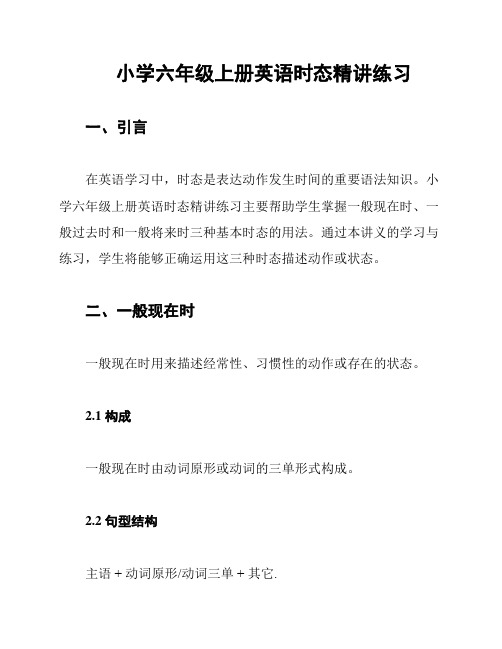
小学六年级上册英语时态精讲练习一、引言在英语学习中,时态是表达动作发生时间的重要语法知识。
小学六年级上册英语时态精讲练习主要帮助学生掌握一般现在时、一般过去时和一般将来时三种基本时态的用法。
通过本讲义的学习与练习,学生将能够正确运用这三种时态描述动作或状态。
二、一般现在时一般现在时用来描述经常性、习惯性的动作或存在的状态。
2.1 构成一般现在时由动词原形或动词的三单形式构成。
2.2 句型结构主语 + 动词原形/动词三单 + 其它.2.3 练习1. I (eat)_____ breakfast every morning.2. She (go)_____ to school by bus.3. The cat (sleep)_____ on the sofa.三、一般过去时一般过去时用来描述过去发生的动作或存在的状态。
3.1 构成一般过去时由动词的过去式构成。
3.2 句型结构主语 + 动词过去式 + 其它.3.3 练习1. I (watch)_____ a movie yesterday.2. She (visit)_____ her grandparents last week.3. They (play)_____ soccer in the park.四、一般将来时一般将来时用来描述将来要发生的动作或存在的状态。
4.1 构成一般将来时有两种构成方式:will + 动词原形和 be going to + 动词原形。
4.2 句型结构1. 主语 + will + 动词原形 + 其它.2. 主语 + be going to + 动词原形 + 其它.4.3 练习1. I (buy)_____ a new bike next month.2. She (travel)_____ to Japan with her family.3. They (move)_____ to a new house in two years.五、总结通过本讲义的学习与练习,学生应掌握一般现在时、一般过去时和一般将来时三种基本时态的构成、句型结构和用法。
(完整版)小学英语时态讲解及练习(可编辑修改word版)
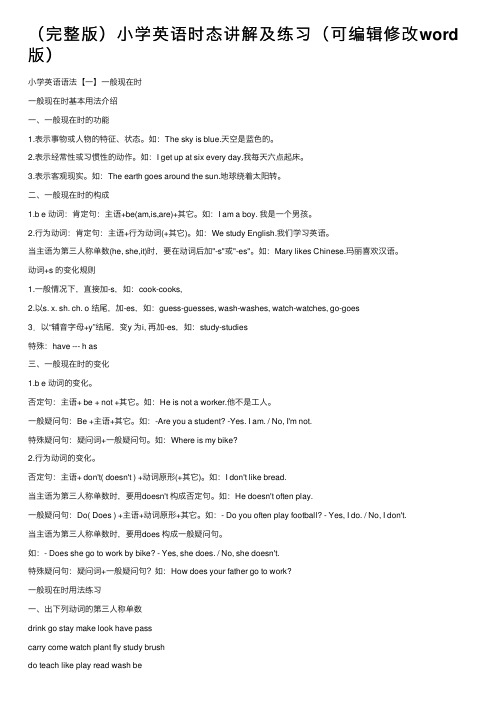
(完整版)⼩学英语时态讲解及练习(可编辑修改word 版)⼩学英语语法【⼀】⼀般现在时⼀般现在时基本⽤法介绍⼀、⼀般现在时的功能1.表⽰事物或⼈物的特征、状态。
如:The sky is blue.天空是蓝⾊的。
2.表⽰经常性或习惯性的动作。
如:I get up at six every day.我每天六点起床。
3.表⽰客观现实。
如:The earth goes around the sun.地球绕着太阳转。
⼆、⼀般现在时的构成1.b e 动词:肯定句:主语+be(am,is,are)+其它。
如:I am a boy. 我是⼀个男孩。
2.⾏为动词:肯定句:主语+⾏为动词(+其它)。
如:We study English.我们学习英语。
当主语为第三⼈称单数(he, she,it)时,要在动词后加"-s"或"-es"。
如:Mary likes Chinese.玛丽喜欢汉语。
动词+s 的变化规则1.⼀般情况下,直接加-s,如:cook-cooks,2.以s. x. sh. ch. o 结尾,加-es,如:guess-guesses, wash-washes, watch-watches, go-goes3.以“辅⾳字母+y”结尾,变y 为i, 再加-es,如:study-studies特殊:have --- h as三、⼀般现在时的变化1.b e 动词的变化。
否定句:主语+ be + not +其它。
如:He is not a worker.他不是⼯⼈。
⼀般疑问句:Be +主语+其它。
如:-Are you a student? -Yes. I am. / No, I'm not.特殊疑问句:疑问词+⼀般疑问句。
如:Where is my bike?2.⾏为动词的变化。
否定句:主语+ don't( doesn't ) +动词原形(+其它)。
如:I don't like bread.当主语为第三⼈称单数时,要⽤doesn't 构成否定句。
小学六年级英语语法一般过去时态讲解及习题
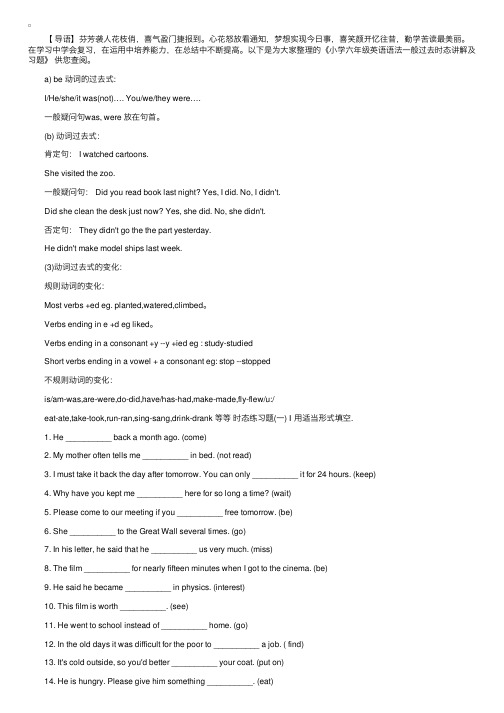
【导语】芬芳袭⼈花枝俏,喜⽓盈门捷报到。
⼼花怒放看通知,梦想实现今⽇事,喜笑颜开忆往昔,勤学苦读最美丽。
在学习中学会复习,在运⽤中培养能⼒,在总结中不断提⾼。
以下是为⼤家整理的《⼩学六年级英语语法⼀般过去时态讲解及习题》供您查阅。
a) be 动词的过去式: I/He/she/it was(not)…. You/we/they were…. ⼀般疑问句was, were 放在句⾸。
(b) 动词过去式: 肯定句: I watched cartoons. She visited the zoo. ⼀般疑问句: Did you read book last night? Yes, I did. No, I didn't. Did she clean the desk just now? Yes, she did. No, she didn't. 否定句: They didn't go the the part yesterday. He didn't make model ships last week. (3)动词过去式的变化: 规则动词的变化: Most verbs +ed eg. planted,watered,climbed。
Verbs ending in e +d eg liked。
Verbs ending in a consonant +y --y +ied eg : study-studied Short verbs ending in a vowel + a consonant eg: stop --stopped 不规则动词的变化: is/am-was,are-were,do-did,have/has-had,make-made,fly-flew/u:/ eat-ate,take-took,run-ran,sing-sang,drink-drank 等等时态练习题(⼀) Ⅰ⽤适当形式填空. 1. He __________ back a month ago. (come) 2. My mother often tells me __________ in bed. (not read) 3. I must take it back the day after tomorrow. You can only __________ it for 24 hours. (keep) 4. Why have you kept me __________ here for so long a time? (wait) 5. Please come to our meeting if you __________ free tomorrow. (be) 6. She __________ to the Great Wall several times. (go) 7. In his letter, he said that he __________ us very much. (miss) 8. The film __________ for nearly fifteen minutes when I got to the cinema. (be) 9. He said he became __________ in physics. (interest) 10. This film is worth __________. (see) 11. He went to school instead of __________ home. (go) 12. In the old days it was difficult for the poor to __________ a job. ( find) 13. It's cold outside, so you'd better __________ your coat. (put on) 14. He is hungry. Please give him something __________. (eat) 15. Please don't waste time __________ TV every evening. You should word hard at English. (watch) 16. We found the window __________. (break) 17. You have dropped your pencil. __________. (拾起它) 18. Mother often tells me __________ too late. (not come home) 19. You had better __________ by bus, or you will be late. (go) 20. I will __________ Li Ming the good news as soon as I see him.( tell) 21. Great changes __________ in our country since 1978. (take place) 22. I __________ my daughter since last month. (hear from) 23. It __________ me two days to write the article. (took) 24. Don't touch that __________ child. (sleep) 25. Every time he tried to start the car, the wheels __________ deepersintosthe mud. (sink) 26. When I got home, I found that my room __________ breaksintosand a lot of things __________. (steal) 27. If I had arrived there earlier, I __________ him. (meet) 28. I didn't remember __________ her the book before. (give) 29. He called at every door, __________ people the exciting news. (tell) 30. Yesterday Mary couldn't finish her homework, so she has to go on __________ it this afternoon. (do) 时态练习题(⼆) 1. We __________ football when it began to rain. We had to stop and go home. (play) 2. Xiao Lin __________ from here for about two hours. (be away) 3.swheres__________? Can you find your birth place on the map? Sorry, I can't. (be born) 4. Last night we __________ back home until the teacher left school. (not go) 5. Comrade Li Dazhao __________ in prison in 1927. (put) 6. Where is professor Lee? He __________ to the library. He'll come back soon. (go) 7. We could not help __________ after we heard the story. (laugh) 8. Would you please __________ me an English-Chinese dictionary when you come? (bring) 9. He told me that he __________ the Great Wall the year before. (visit) 10. I'll tell him the news as soon as he __________ back. (come) 11. The boy __________ by the door is my brother. (stand) 12. Do you remember __________ the film last year? (see) 13. There __________ a physics test next Monday. (be) 14. __________ I finish my homework in class? (必须) No, you needn't. 15. I'm sorry you've missed the last bus. It __________ ten minutes ago. (leave) 16. Wei Fang is heard __________ English every morning. (hear) 17. John stopped __________ a rest (have) because he __________ for three hours. (work) 18. I'm sorry to have kept you __________. (wait) 19. A new theatre __________ now. (build) 20. The boys __________ basketball on the playground are my classmates. (play) 21. I regretted answering like that, I was sorry __________ so. (do) 22. Can't you see I'm busy __________? (cook) 23. He __________ worried when coming into the teacher's office. (look) 24. __________ come beef! (随便吃点) 25. It's a great shame for me __________ in front of so many people. (laugh at) 26.Look!That man_ (open)the door of your car. 27.T.he moon_ (go)round the earth. 28.I must go now.It_ (get)late. 29.Let's go out.It_ (not/rain)now. 30.Julia is vera good at languages.She_ (speak)four languages very well. 31.Hurry up!Everybody_ (wait)for you. 32."_ (you/listen)to the radio?""No,you can turn it off." 33."_ (you/listen)to the radio?""No,just occasionally. 34.We usually_ (grow)vegetables in our garend but this year we_ (not/grow)any. 35.Ron is in London at the moment.He _ (stay)at the Park Hotel. He _ (always/stay)there when he's in London. 36.Can we stop walking soon?I_ (feel)tired. 37.Can you drive I_ (learn).My father_ (teach)me. ually I (finish)work at 5:00,but this week I (work)until 6:00to earn a bit more money. 39.My parents_ (live)in Bristol.They were bron there and have never lived anywhere else.。
小学英语语法时态归纳及练习(含答案解析)

英语时态归纳一、一般现在时:标志词:often(经常) sometimes(有时) always(总是) usually(通常) never(从不) every(每一)行为动词词型变化形式:一般现在时动词只有第三人称有词形变化;其他人称(第一人称:I, we;第二人称:you;第三人称复数:they、my friends)动词均用原形。
当主语是第三人称单数时,一般动词在一般现在时句子中的变化规律:1、多数在动词后加s:play—plays like—likes ,2、以s,x,sh,ch,o结尾的动词加es wash–washes catch–catches do–does3、以辅音字母加y结尾,把y改i再加es fly—flies study—studies4、以元音字母加y结尾,直接加s buy – buys5、不规则变化have—has一般现在时基本用法功能1.表示事物或人物的特征、状态。
如:The sky is blue.天空是蓝色的。
2.表示经常性或习惯性的动作。
如:I get up at six every day.我每天六点起床。
3.表示客观现实。
如:The earth goes around the sun.地球绕着太阳转。
The earth is round.构成1. be动词:主语+be(am,is,are)+其它。
如:I am a boy.我是一个男孩。
2.行为动词:主语+行为动词(+其它)。
如:We study English.我们学习英语。
句型肯定句:A.be动词:主语+ be + 其它成分He is a worker.B.行为动词:主语+动词(注意人称变化) +其它成分We like the little cat.否定句:A.be动词:主语+ be + not+其它成分They are not students.B.行为动词:主语+助动词(do/does) + not+动词原形+其它成分We don’t like the little cat.一般疑问句:A.be动词:Am / Is /Are +主语+ 其它成分Are you a teacher? Yes, I am. / No, I am not.Are they students of your school. Yes, they are / No they aren’t.B.行为动词:助动词(Do/Does)+主语+动词原形+ 其它成分Do you like it? Yes, I do. / No. I don’t .Does he(she) like it? Yes, he( she )does. / No, he ( she )doesn’t.特殊疑问句:疑问词+ 一般疑问句A.be动词:How many students are there in your school?B.行为动词:What do you usually do on Sunday?一般现在时动词be和have的变化形式1.动词Be 叫连系动词, 用法:第一人称单数用am,第三人称单数用is,其它人称用are。
人教版小学六年级英语各时态结构总结及练习题(cy)
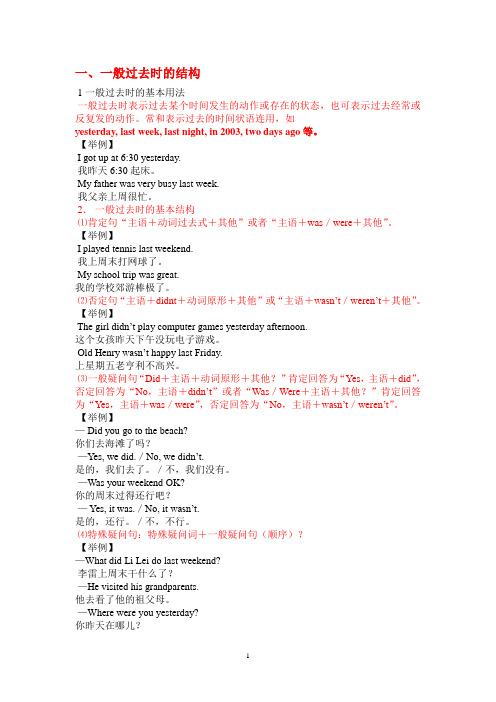
一、一般过去时的结构1一般过去时的基本用法一般过去时表示过去某个时间发生的动作或存在的状态,也可表示过去经常或反复发的动作。
常和表示过去的时间状语连用,如y esterday, last week, last night, in 2003, two days ago等。
【举例】I got up at 6:30 yesterday.我昨天6:30起床。
My father was very busy last week.我父亲上周很忙。
2.一般过去时的基本结构⑴肯定句“主语+动词过去式+其他”或者“主语+was/were+其他”。
【举例】I played tennis last weekend.我上周末打网球了。
My school trip was great.我的学校郊游棒极了。
⑵否定句“主语+didnt+动词原形+其他”或“主语+wasn’t/were n’t+其他”。
【举例】The girl didn’t play computer games yesterday afternoon.这个女孩昨天下午没玩电子游戏。
Old Henry wasn’t happy last Friday.上星期五老亨利不高兴。
⑶一般疑问句“Did+主语+动词原形+其他?”肯定回答为“Yes,主语+did”,否定回答为“No,主语+didn’t”或者“Was/Were+主语+其他?”肯定回答为“Yes,主语+was/were”,否定回答为“No,主语+wasn’t/were n’t”。
【举例】— Did you go to the beach?你们去海滩了吗?—Yes, we did./No, we did n’t.是的,我们去了。
/不,我们没有。
—Was your weekend OK?你的周末过得还行吧?— Yes, it was./No, it wasn’t.是的,还行。
/不,不行。
⑷特殊疑问句:特殊疑问词+一般疑问句(顺序)?【举例】—What did Li Lei do last weekend?李雷上周末干什么了?—He visited his grandparents.他去看了他的祖父母。
小学英语语法大全-附练习题(附答案)

Contents第一章名词1.名词的数2.名词的格第二章代词1.人称代词2.物主代词第三章冠词与数词1.冠词2.数词第四章一般现在时态第五章现在进行时态第六章句型1.陈述句2.疑问句3.祈使句4.There be 句型与have\ has第七章总结考试第一章名词(Noun)名词的概念在生活中,我们会接触到各种各样的人和事物,用来表示这些人或事物名称的词就是名词。
一、名词的数名词的数指名词的单数和复数形式。
可数名词表示“一个”时用单数,“两个以上”时用复数;不可数名词表示量时,通常用“数词+单位+of+物质名词”的形式,如 a piece of bread (一片面包),变为复数时,只须将单位名词变为复数,如:two pieces of bread(两片面包)。
*名词复数的构成法则1. 一般情况下在词尾加 s. 词尾读音shop --- shops (商店) 在清辅音后读[ s ]bag --- bags (书包) 在浊辅音后读[ z ]window --- windows (窗户) 在元音后读[ z ]2. 以s, x, sh, ch 结尾的单词在词尾加es。
class --- classes (班级) 词尾读音[ iz ]box --- boxes (盒子)match --- matches (比赛)brush --- brushes (刷子)3. 以“辅音字母+y”结尾的词,变y为i 加es.story --- stories (故事) 词尾读音[ iz ]4. 以“元音字母+y”结尾的词,在词尾直接加skey --- keys 词尾读音[ z ]monkey --- monkeys5.以“o”结尾的名词,复数一般在词尾加“s”, 但个别加“es”tomato --- tomatoes (西红柿) 词尾读音[ z ]potato --- potatoes (土豆)zoo --- zoos (动物园)photo --- photos (照片)*(以“o”结尾,复数加“es”)口诀:黑人(Negro)英雄(hero),左手拿着西红柿(tomato),右手拿着破土豆(potato),头顶一个大芒果(mango)。
(完整版)小学现在完成时详细讲解与练习

(完整版)小学现在完成时详细讲解与练习什么是现在完成时?现在完成时是英语中的一种时态,用来描述过去发生的动作或事件对现在造成的影响或结果。
在现在完成时中,动词需要用到助动词“have/has”加上过去分词形式。
如何构成现在完成时的肯定句?现在完成时的肯定句构成为:“主语 + have/has + 过去分词 + 其他补充信息”。
例如:- I have finished my homework.(我已经完成了我的作业。
)- He has seen that movie.(他已经看过那部电影。
)如何构成现在完成时的否定句?现在完成时的否定句构成为:“主语 + have/has + not + 过去分词 + 其他补充信息”。
例如:- I have not finished my homework.(我还没有完成我的作业。
)- She has not seen that movie.(她还没有看过那部电影。
)如何构成现在完成时的疑问句?现在完成时的疑问句构成为:“Have/Has + 主语 + 过去分词 +其他补充信息?”例如:- Have you finished your homework?(你完成作业了吗?)- Has she seen that movie?(她看过那部电影吗?)现在完成时的用法现在完成时通常用来表示以下几种情况:1. 过去发生的动作对现在造成的影响或结果。
2. 过去开始的动作直到现在还在持续进行。
3. 刚刚完成的动作或经历。
例如:- I have lost my wallet.(我丢了钱包。
)- They have lived in this city for ten years.(他们在这个城市已经住了十年。
)- She has just arrived at the airport.(她刚刚到达机场。
)现在完成时的练1. 请用现在完成时造句:(例句仅供参考)- 我已经吃过晚饭了。
小学英语语法一般现在时(包括练习)
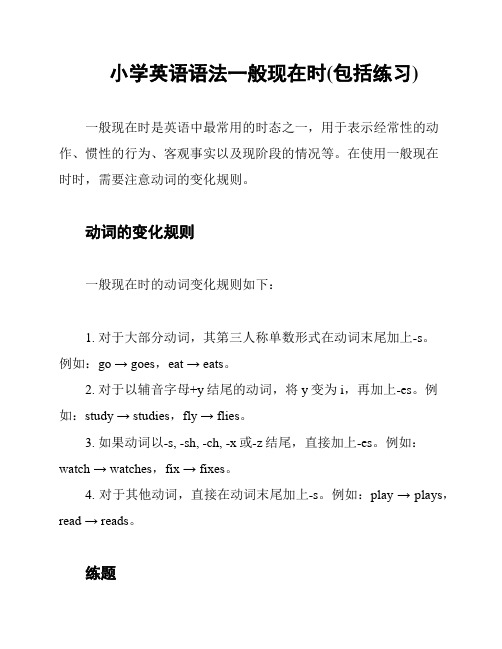
小学英语语法一般现在时(包括练习)一般现在时是英语中最常用的时态之一,用于表示经常性的动作、惯性的行为、客观事实以及现阶段的情况等。
在使用一般现在时时,需要注意动词的变化规则。
动词的变化规则一般现在时的动词变化规则如下:1. 对于大部分动词,其第三人称单数形式在动词末尾加上-s。
例如:go → goes,eat → eats。
2. 对于以辅音字母+y结尾的动词,将y变为i,再加上-es。
例如:study → studies,fly → flies。
3. 如果动词以-s, -sh, -ch, -x或-z结尾,直接加上-es。
例如:watch → watches,fix → fixes。
4. 对于其他动词,直接在动词末尾加上-s。
例如:play → plays,read → reads。
练题请根据句子的语境,用适当的动词形式填空。
每个空格只填一个单词。
1. Peter ___________ (like) to play basketball with his friends every weekend.2. My mother ___________ (work) as a nurse in the hospital.3. The cat ___________ (sleep) on the sofa most of the day.4. We ___________ (watch) movies at the cinema every Friday night.5. Sarah ___________ (brush) her teeth twice a day.参考答案1. Peter likes to play basketball with his friends every weekend.2. My mother works as a nurse in the hospital.3. The cat sleeps on the sofa most of the day.4. We watch movies at the cinema every Friday night.5. Sarah brushes her teeth twice a day.以上是关于小学英语语法一般现在时以及练习题的内容。
- 1、下载文档前请自行甄别文档内容的完整性,平台不提供额外的编辑、内容补充、找答案等附加服务。
- 2、"仅部分预览"的文档,不可在线预览部分如存在完整性等问题,可反馈申请退款(可完整预览的文档不适用该条件!)。
- 3、如文档侵犯您的权益,请联系客服反馈,我们会尽快为您处理(人工客服工作时间:9:00-18:30)。
小学英语语法【一】一般现在时一、一般现在时的功能1.表示事物或人物的特征、状态。
如:The sky is blue.天空是蓝色的。
2.表示经常性或习惯性的动作。
如:I get up at six every day.我每天六点起床。
3.表示客观现实。
如:The earth goes around the sun.地球绕着太阳转。
二、一般现在时的构成1.be动词:肯定句:主语+be(am,is,are)+其它。
如:I am a boy. 我是一个男孩。
2.行为动词:肯定句:主语+行为动词(+其它)。
如:We study English.我们学习英语。
当主语为第三人称单数(he, she,it)时,要在动词后加"-s"或"-es"。
如:Mary likes Chinese.玛丽喜欢汉语。
动词+s的变化规则1.一般情况下,直接加-s,如:cook-cooks,2.以s. x. sh. ch. o结尾,加-es,如:guess-guesses, wash-washes, watch-watches, go-goes 3.以“辅音字母+y”结尾,变y为i, 再加-es,如:study-studies特殊:have----has三、一般现在时的变化1.be动词的变化。
否定句:主语+ be + not +其它。
如:He is not a worker.他不是工人。
一般疑问句:Be +主语+其它。
如:-Are you a student? -Yes. I am. / No, I'm not.特殊疑问句:疑问词+一般疑问句。
如:Where is my bike?2.行为动词的变化。
否定句:主语+ don't( doesn't ) +动词原形(+其它)。
如:I don't like bread.当主语为第三人称单数时,要用doesn't构成否定句。
如:He doesn't often play.一般疑问句:Do( Does ) +主语+动词原形+其它。
如:- Do you often play football? - Yes, I do. / No, I don't.当主语为第三人称单数时,要用does构成一般疑问句。
如:- Does she go to work by bike?- Yes, she does. / No, she doesn't.特殊疑问句:疑问词+一般疑问句?如:How does your father go to work?练习1.He often ________(have) dinner at home.2.Daniel and Tommy _______(be) in Class One.3.We _______(not watch) TV on Monday.4.Nick _______(not go) to the zoo on Sunday.5.______ they ________(like) the World Cup?6.What _______they often _______(do) on Saturdays?7._____ your parents _______(read) newspapers every day?8.The girl _______(teach) us English on Sundays.9.She and I ________(take) a walk together every evening.10.There ________(be) some water in the bottle.11.Mike _______(like) cooking.12.They _______(have) the same hobby.13.My aunt _______(look) after her baby carefully.14.You always _______(do) your homework well.15.I _______(be) ill. I’m st aying in bed.16.She _______(go) to school from Monday to Friday.17.Liu Tao _______(do) not like PE.18.The child often _______(watch) TV in the evening.19.Su Hai and Su Yang _____(have) eight lessons this term.20. -What day _____(be) it today?-It’s Saturday.现在进行时1.现在进行时表示现在正在进行或发生的动作,也可表示当前一段时间内的活动或现阶段正在进行的动作。
2.现在进行时的肯定句基本结构为be+动词ing.3.现在进行时的否定句在be后加not。
4.现在进行时的一般疑问句把be动词调到句首。
5.现在进行时的特殊疑问的基本结构为:疑问词+ be + 主语+ 动词ing?但疑问词当主语时其结构为:疑问词+ be + 动词ing?标志词:look now listen It’s +点钟动词加ing的变化规则1.一般情况下,直接加ing,如:cook-cooking2.以不发音的e结尾,去e加ing,如:make-making, taste-tasting ,write—writing , ride—riding ,have—having come—coming dance—dancing live—living take—taking skate—skating3.如果末尾是一个元音字母和一个辅音字母,双写末尾的辅音字母,再加ing,如:swim—swimming begin—beginning run-running, sit—sitting put—putting get—getting shop—shopping stop-- stopping现在进行时练习1.The boy __________________ ( draw)a picture now.2. Listen .Some girls _______________ ( sing)in the classroom .3. My mother _________________ ( cook )some nice food now.4. What _____ you ______ ( do ) now?5. Look . They _______________( have) an English lesson .6.They ____________(not ,water) the flowers now.7.Look! the girls ________________(dance )in the classroom .8.What is our granddaughter doing? She _________(listen ) to music.9. It’s 5 o’clock now. We _____________(have)supper now10.______Helen____________(wash )clothes? Yes ,she is .一、概念:表示将要发生的动作或存在的状态及打算、计划或准备做某事。
句中一般有以下时间状语:tomorrow, next day(week, month, year…),soon, the day after tomorrow(后天)等。
二、基本结构:①be going to + do;②will+ do.三、否定句:在be动词(am, is, are)后加not或情态动词will后加not成won’t。
例如:I’m going to have a picnic this afternoon.→ I’m not going to have a picnic this afternoon.四、一般疑问句:be或will提到句首,some改为any, and改为or,第一二人称互换。
例如:We are going to go on an outing this weekend. → Are you going to go on an outing this weekend?五、对划线部分提问。
一般情况,一般将来时的对划线部分有三种情况。
1.问人。
Who例如:I’m going to New York soon. →Who’s going to New York soon.2.问干什么。
What … do.例如:My father is going to watch a race with me this afternoon.→What is your father going to do with you this afternoon.3.问什么时候。
When.例如:She’s going to go to bed at nine. →When is she going to bed?六、同义句:be going to = willI am going to go swimming tomorrow(明天). = I will go swimming tomorrow.练习11.Today is a sunny day. We ___________________ (have) a picnic this afternoon.12.My brother _______________ (go) to Shanghai next week.13.Tom often ______________(go) to school on foot. But today is rain. He __________ (go) to school by bike.14.What do you usually do at weekends?I usually __________ (watch) TV and ____________(catch) insects?15.It’s Friday today. What ___she ____ (do) this weekend?She ______(watch) TV and_______ (catch) insects.16.What ___________ (d0) you do last Sunday? I ____________ (pick) apples on a farm.What ______________ (do) next Sunday? I ______________ (milk) cows.17.Mary ____________ (visit) her grandparents tomorrow.18.Liu Tao ____________ (fly) kites in the playground yesterday.19.David ______________ (give) a puppet show next Monday.20.I ________________ (plan) for my study now小学英语语法【四】一般过去时一、一般过去时语法介绍1.一般过去时表示过去某个时间发生的动作或存在的状态,常和表示过去的时间状语连用。
